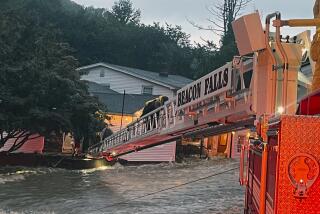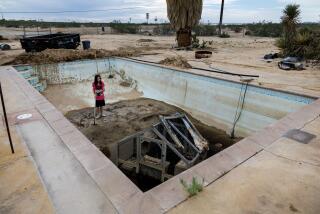Awash and Alone, Along the Ohio
- Share via
UTICA, Ind. — Independence is a prized American trait, but there were more than a few sodden residents in this sunken small town who wondered aloud Thursday if they would have been drier living in the big city across the river.
Perched on the steep hills that brace the only habitable houses left in town, they stared enviously at the distant concrete floodgates that have protected the riverfront of Louisville from the rising Ohio River’s weeklong flood.
“After what we’ve gone through, we’d have been better off part of the big city,” said Utica Town Council member Dixie Harbin, who has been sleeping in a camper since brackish water rose to the first-floor ceiling of her house.
Utica is not the sort of picturesque place whose troubles easily tug on the nation’s heartstrings. An urban bedroom community that lost buffering farmland to an industrial park, Utica abuts an oil refinery and a steel processing plant. Despite its cross-river proximity to Louisville, the town of 500 took on the Ohio’s gathering flood without much help from its urban neighbors and, having lost, now faces rebuilding itself by itself.
Even though the deepened river has yet to reach its crest, emergency officials across the Ohio River Valley took advantage of a day without rain Thursday to tally damage that is approaching $1 billion in scores of towns, plan the reconstruction of thousands of waterlogged houses and, in one devastated northeastern Kentucky community, search for the presumed dead.
In Falmouth, where the bodies of four residents were found Wednesday in two submerged trailers, National Guardsmen and police searched house by house Thursday for several more people missing since the town of 2,700 was battered last weekend by a flash flood along the Licking River.
In Utica, the search was less dire, but just as pressing--for a sure-fire way to keep the last road leading into town open. Rotating teams of National Guard troops worked through dawn Thursday to build a sandbag wall high and dense enough to keep the Ohio from overrunning the one-lane route into town.
It was a small-scale operation, dwarfed by the sandbagging assembly line that sprang up in Tell City, Ind., 60 miles to the west, where a crowd of 500 volunteers worked to salvage their leaking flood wall. The problem, said Tell City police officer Mark Newton, was “an old sewer system that ran near [the flood wall]. The water went through it.”
But however minor, Utica’s woes underscored how a surging river is an equal opportunity scourge, probing for weak spots just as ferociously in low-lying urban areas as it does in remote country towns.
“Water’s water. It’s gonna seek its own level,” said Mike Lewis, who had been nervously watching the Ohio rise toward the first floor of his Utica riverfront house. “Just so long as it doesn’t come in my front door.”
Lewis and his wife, Brenda, stormed out of their threatened house Thursday morning, bellowing at the weekend soldiers who were sandbagging and running a burping electric pump to keep Utica-Sellersburg Road open. The problem, Lewis complained, was that the pump was keeping the road dry, but it was funneling tiny waves of water toward his house, each one slapping precariously up his front deck.
“We’ve got new carpeting in there! Designer weave!” he moaned. The guardsmen stared at him blankly.
The soldiers were the only outside help Utica has managed to wangle since the Ohio began flooding Sunday. The river has overtaken half of the town’s 300 houses, but county officials had yet to arrive to take inventory of the damage. The fast-moving water ran into the town’s newly redecorated fire station, ruining rugs, shorting out a soda machine and forcing the town’s volunteer firefighters to park their engines on the bluffs above the water.
“The town just put out all this money and now they’ll have to do it twice,” said Gregory Linker, a volunteer firefighter.
During the flood’s first hours, town residents had to call around on their own to find a towing service willing to haul waterfront house trailers out of danger. The towers who showed up immediately began hiking their fees as the water surged--from $500 for the first trailer to $2,500 for those unlucky enough to be later in line.
“They were gouging us, but there was nobody to call to complain to,” Linker said. When the towers were audacious--or dumb--enough to return for a second day, a group of angry Utica residents approached them and “told them either they cut their prices or they’d get thrown in the river,” Linker said. “That seemed to do the trick.”
In a town so small it does not even elect a mayor, Linker was serving Thursday morning as Utica’s ranking emergency official. Sitting alone in the log cabin that serves as the town’s City Hall, he insisted that while Utica has mostly muddled through on its own over the last week, its plight has not gone completely unnoticed.
The city of Utica in upstate New York had apparently decided to adopt the Indiana town as a sister city. “Someone called to say there would be some kind of relief effort,” Linker said.
And a country radio station in Richmond, Ind., “picked us at random out of all the news stories,” Linker said. Semitrucks full of cleaning supplies and spare clothes had been promised.
“They say they’ll be down here soon,” Linker said. “It’ll be nice to have some help for a change.”
More to Read
Sign up for Essential California
The most important California stories and recommendations in your inbox every morning.
You may occasionally receive promotional content from the Los Angeles Times.










